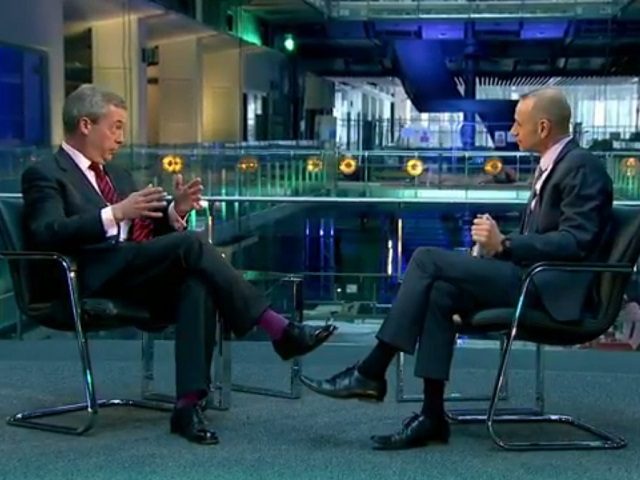The British Broadcasting Corporation’s (BBC’s) coverage of issues surrounding the European Union (EU) and British membership of the EU shows significant bias in favour of a pro-EU, Remain stance, the Institute of Economic Affairs (IEA) has found.
The BBC has an overwhelming monopoly on news consumption in the UK, with 48 percent of Brits getting their news from BBC 1 alone. Yet detailed analysis by the IEA has revealed clear examples of what researchers at the free-market think tank have termed “bias by omission” – that is, skewing public discourse on a topic by not giving air-time to one side of the debate. And they say that the BBC has shown this sort of bias in spades when it comes to debate around the EU.
They point to the Today Programme which invited over 4,200 guests on to talk about EU themes over a decade, just 3.2 percent of whom were identifiably in favour of withdrawing from the EU.
Similarly, in an episode of Newsnight which focused exclusively on the EU question, 18 guests were in favour of remaining in the EU while just one advocated leaving.
“Clearly, the future of the UK’s position in the EU divides political parties and also the business community,” said Ryan Bourne, the author of the report, which features in a new book advocating privatisation of the BBC.
“But in its selection of guests, perhaps driven by the state of the political landscape at the time, the Today programme has at least exhibited a clear relative bias by omission against a significant strand of opinion.
“Given the BBC’s funding mechanism and reputation, this could have an important impact as the UK prepares to vote in a referendum on membership of the EU.”
The referendum has thrown the issue into sharp focus, prompting the BBC to discuss EU membership specifically. During the General Election period in 2015, when the Conservatives were promising a vote on the EU in their manifesto, the Today Programme invited 25 speakers from the business community to discuss the subject.
Of those, the report found that “two gave a neutral response; two (both from the Confederation of British Industry (CBI)) said that the referendum decision was a matter for government, but they were generally pro-EU membership; and two (Conservative politicians) said they were in favour of the referendum but wished to remain in a reformed EU. The remaining nineteen speakers all saw the in/out referendum as a worry or a threat to business.”
Yet polling found that business backed the holding of a referendum by 66 percent to 25 percent.
“The overwhelming narrative in the selection of guests was that the referendum, by creating uncertainty, would be bad for business and bad for Britain,” Mr Bourne notes.
“Audiences on the Today programme have been offered no perspective that might suggest that the in/out referendum or leaving the EU is an opportunity for Britain rather than a concern.”
However, the bias against pro-Brexit voices is a long term trend. Detailed analysis of thousands of episodes of the Today Programme aired between March 2004 and June 2015, found that during that period, 4,275 speaking contributions were made on EU themes, of which just 132 of these (3.2 percent) were identifiably in favour of Brexit.
Moreover, 72 percent of pro-Brexit speakers were representatives of the UKIP, and over a third (37 percent) of all pro-Brexit contributions were from Nigel Farage alone. Left wing pro-Brexit speakers accounted for a mere 0.07 percent of all speakers on the topic – three from the Labour Party, and one from the Socialist Labour Party.
“In comparison with public opinion, the Today programme has exhibited significant bias by omission in terms of excluding the voices of those who believe Britain should leave the EU, particularly non-UKIP voices,” Bourne notes.
More recently, a January 2013 edition of Newsnight, the BBC’s flagship news program, was devoted entirely to the Prime Minister David Cameron’s announcement of an in/out referendum. Viewers would have been forgiven for assuming that a balance would be struck between those advocating remaining and those who wanted to leave the EU, but in fact 18 speakers in favour of remaining were set against just one who wanted to leave: Nigel Farage.
The BBC has an overwhelming monopoly on news consumption within the UK. According to Ofcom figures, BBC outlets featured seven times in the Top 20 ranking news sources in terms of reach among all adults in 2015, with BBC One reaching a massive 48 percent of the adult population. The BBC news channel reached 14 percent, while the BBC’s website reached 24 percent of all adults.
By contrast, the Daily Mail is read by just six percent of the population, while four percent read its website. Along with The Sun, also on six percent, it was the only printed newspaper to make the top 20 (The Guardian website also sneaked in, being accessed by four percent of Brits).
And while pro-Brexit voices will try to make up for the slew of pro-EU news coming from the BBC, it may be a case of too little, too late.
As Mr Bourne says: “With a referendum on Britain’s membership of the EU scheduled for 23 June 2016, this relative bias by omission could be very important indeed. Within academic media theory, there is a line of reasoning that media influence on audiences is not immediate but occurs more through a continual process of repeated arguments – the ‘drip-drip-drip’ effect.”

COMMENTS
Please let us know if you're having issues with commenting.